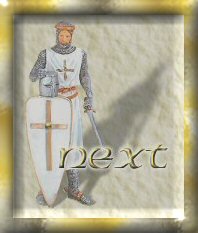|  SECOND CRUSADE MAJOR PLAYERS | Pope Eugenius III | Called for Second Crusade in 1145 | | St Bernard of Clairvaux | Largely responsible for support of the Crusade | | Saladin | Turkish general who united the Turkish sultans against the West | | Louis VII | King of France, Crusader General | | Eleanor of Aquitaine | First woman to openly declare herself as a Crusader Knight; Queen of France & wife of Louis VII | | Emperor Manuel | Emperor of Constantinople, seat of the Byzantine Empire | | Conrad of Germany | King & Crusader General | | Geza of Hungary | King & Crusader General | | Roger of Sicily | King & CrusaderGeneral | | Raymond of Toulouse | Governor of Antioch & uncle of Eleanor of Aquitaine | MAJOR BATTLES | Lisbon | Portugeuse city captured by the Crusaders at the request of Henry of Portugal | The Second Crusade was called as a direct result of the fall of Edessa into Turkish hands. The city that was so successfully captured in the First Crusade was the first major Crusader settlement to return to Turkish rule. A mighty new Turkish general, Saladin, had succeeded in uniting the Turks against the western empires. Late in 1145, Pope Eugenius III called for the Second Crusade. The initial response to this demand for retaliation was unenthusiastic. Pope Eugenius urged one of his protégés, St. Bernard of Clairvaux, to rally support. Under Bernard's urging, King Louis VII of France was the first man (with an army behind him) to take up the cross. Legend also tells of Eleanor of Aquitaine, the first woman to passionately embrace the Crusades as a fellow warrior, bringing many women with her. Other Kings soon took up the cause, Emperor Manuel, Conrad of Germany, Geza of Hungary, and Roger of Sicily. The first contingent of Crusaders to depart for the Byzantine Empire and the Turkish lands beyond was waylaid in Portugal due to bad weather. Henry of Portugal convinced the Crusader knights that while they were in the area, they might as well help him take the city of Lisbon. The Crusaders agreed, and the city was easily taken. At this point many of the Crusaders decided to return home. Many speculations have been suggested as to why many left so soon. Perhaps they felt they had done their duty to liberate a city, never mind that it was the intended city of Edessa. Perhaps others had lost the taste for travel or warfare. The ones who remain rested in Lisbon. Meanwhile King Conrad and his troops approached Constantinople. His army did not receive a warm welcome in Byzantium and when they reached Constantinople, they quickly crossed the Bosporus harbor into Turkish territory. Near the end of 1147, Conrad's army was resting outside of Dorylaeum when Turkish troops took them by surprise. Conrad fled to Nicea leaving his entire army at the mercy of the Turks.
The remainder of the Crusading army, some coming in slowly from Portugal while the rest came from France, finally arrived in Turkish territory in December of 1147. Conrad was picked up along the way, and the army spent Christmas feasting in the city of Ephesus. Conrad took sick here and was shipped back to Constantinople to recover. The Crusader army under the direction of King Louis decided to take "the short route" over land to Antioch. During their treck through the mountains the army faced a terrible ambush from Turkish troops, and Louis himself had to hide in a tree. Rumors say the Knights Templar were given command of the army after the Crusaders barely escaped with their lives. When the Crusaders finally emerged from the mountains in February of 1148, they had had enough of the land route. They immediately commissioned ships at the city of Attalia to take them to Antioch. Of course there weren't enough ships to transport everyone, so Louis and a few knights went ahead leaving the majority of the troops in Attalia. A second wave of Crusaders was finally sent from Attalia by ship, and the rest decided to brave the remainder of the journey on foot. The majority of the Crusaders who traveled on foot never made it to Antioch.
Eleanor eagerly met her uncle, Raymond of Toulouse, the governor of Antioch, when the first wave of Crusaders finally arrived in Antioch. Raymond was of the opinion that in order to secure Edessa, the city of Aleppo must first be captured. Eleanor loudly supported her uncle's position. Joscelyn, the governor of Edessa (who was sheltering in Antioch) felt that Edessa should be attacked first, and Aleppo secured later. Louis didn't make any commitments until a man from Jerusalem arrived with word that King Conrad had already arrived in Jerusalem. Eleanor continued to object to her husband’s decision but her reputation was already in question. Perhaps fearing that his wife was too interested in the opinions of her uncle, Louis had the queen and her entire retinue removed under guard late one night. Eleanor was escorted back to France. Louis arrived in Jerusalem without mentionable incident.
The decision was made to attack the city of Damascus first. It was the most politically neutral option, and it would give the Crusaders more stability in the region. In July of 1148 they set up a blockade at Damascus. Many attempts were made to approach the walls of the city, and the enemy tried from various angles, but they soon realized that they did not have the manpower or resources to take Damascus. The decision was made to retreat. The Crusaders were attacked all the way back to Jerusalem and they were so reduced in number that it became apparent the army was no longer affective. The march continued from Jerusalem back into secured territories. King Conrad immediately abandoned the Crusades to return home. King Louis retained hope and stayed in Jerusalem until 1149, when he too returned home. 
|
 Free Forum Hosting
Free Forum Hosting